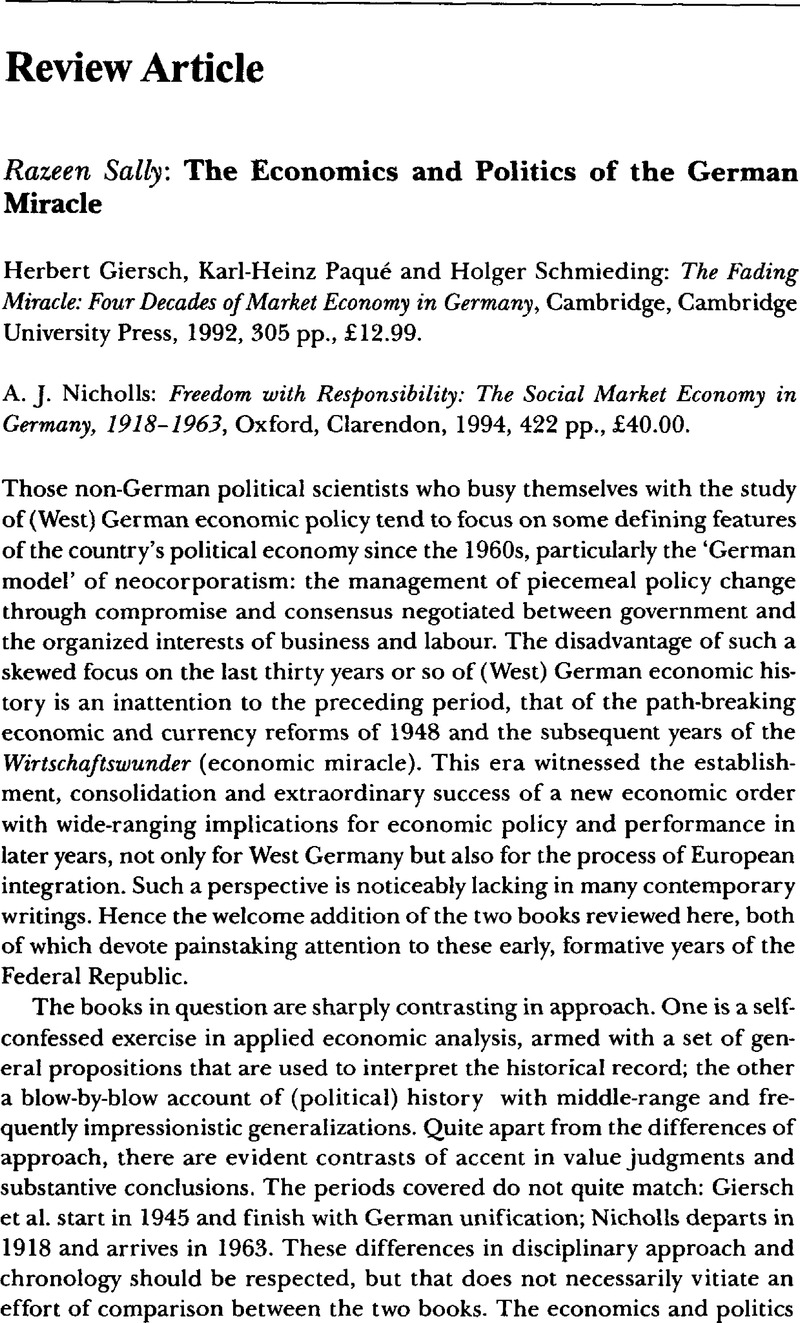Article contents
The Economics and Politics of the German Miracle
Published online by Cambridge University Press: 28 March 2014
Abstract

- Type
- Review Articles
- Information
- Copyright
- Copyright © Government and Opposition Ltd 1995
References
1 See for example Werner Abelshauser, Wirtschaftsgeschichte der Bundesrepublik Deutschland 1945–1980, Frankfurt a.M., Suhrkamp, 1983.
2 Reich, Simon, The Fruits of Fascism: Post-war Prosperity in Historical Perspectives Ithaca, Cornell University Press, 1990.Google Scholar
3 See Milward, Alan, The Reconstruction of Western Europe 1945–51, London, Methuen, 1984.Google Scholar
4 The economist Wilhelm Röpke once made reference to his neoliberal friends as ‘We few, we happy few, we band of brothers’, likening them to Henry V’s army before Agincourt.
5 For an explanation of ordoliberalism and a distinction between it and social market economy, see my previous article, ‘The Social Market and Liberal Order: Theory and Policy Implications’, Government and Opposition, Vol. 29, No. 4, Autumn 1994, pp. 461–80.
6 Walter Eucken, Grundsätze der Wirtschaftspolitik, Tübingen, J.C.B. Mohr, 1990.
7 See Wilhelm Röpke, International Order and Economic Integration, Dordrecht, Reidel, 1959.
8 Müller-Armack, Alfred, ‘The Meaning of the Social Market Economy’, in Peacock, Alan and Willgerodt, Hans (eds), Germany’s Social Market Economy: Origins and Evolution, London, TPRC/Macmillan, 1989.CrossRefGoogle Scholar
9 On this conception of the ‘social’, see Horst Friedrich Wünsche, ‘Ludwig Erhards Soziale Marktwirtschaft: Ein Diskurs über fehldeutungen und Entstellungen’, Ordo, 45, 1994. Wilhelm Röpke’’s Jenseits von Angebot und Nachfrage, Zurich, Rentsch, 1958, arguably provides the most comprehensive statement of a social conservatism in the German neoliberal tradition.
10 Surely the definitive debunking of the association between Adam Smith and an unadulterated laissez faire is to be found in Jacob Viner’s classic essay, ‘Adam Smith and laissez faire’, in The Long View and the Short: Studies in Economic Theory and Policy, Glencoe, The Free Press, 1958.
11 One of the leading contemporary historians of economic thought, Terence Hutchison, considers the Freiburg School, with its concern for the legal and institutional order, the closest twentieth century heir to Adam Smith. See his ‘Notes on the Effects of Economic Ideas on Policy: The Example of the German Social Market Economy’’, J’ournal of Institutional and Theoretical Economics, 135, pp. 426–41.
12 Egon Tuchtfeld and Hans Willgerodt, ‘Wilhelm Röpke — Leben und Werk’, in Wilhelm Röpke, Die Lehre von der Wirtschaft, Bern, Haupt, 1994.
13 It is also worth pointing out that Karl Schiller, once the leading German proponent of social democratic neo-Keynesianism and mentioned by Nicholls in highly approving terms, came in later life to embrace a more clear-cut ‘Freiburg’ economic liberalism with a strong dose of Hayek. See his Der schwierige Weg in die offene Gesellschaft, Berlin, Siedler, 1994.
- 2
- Cited by


